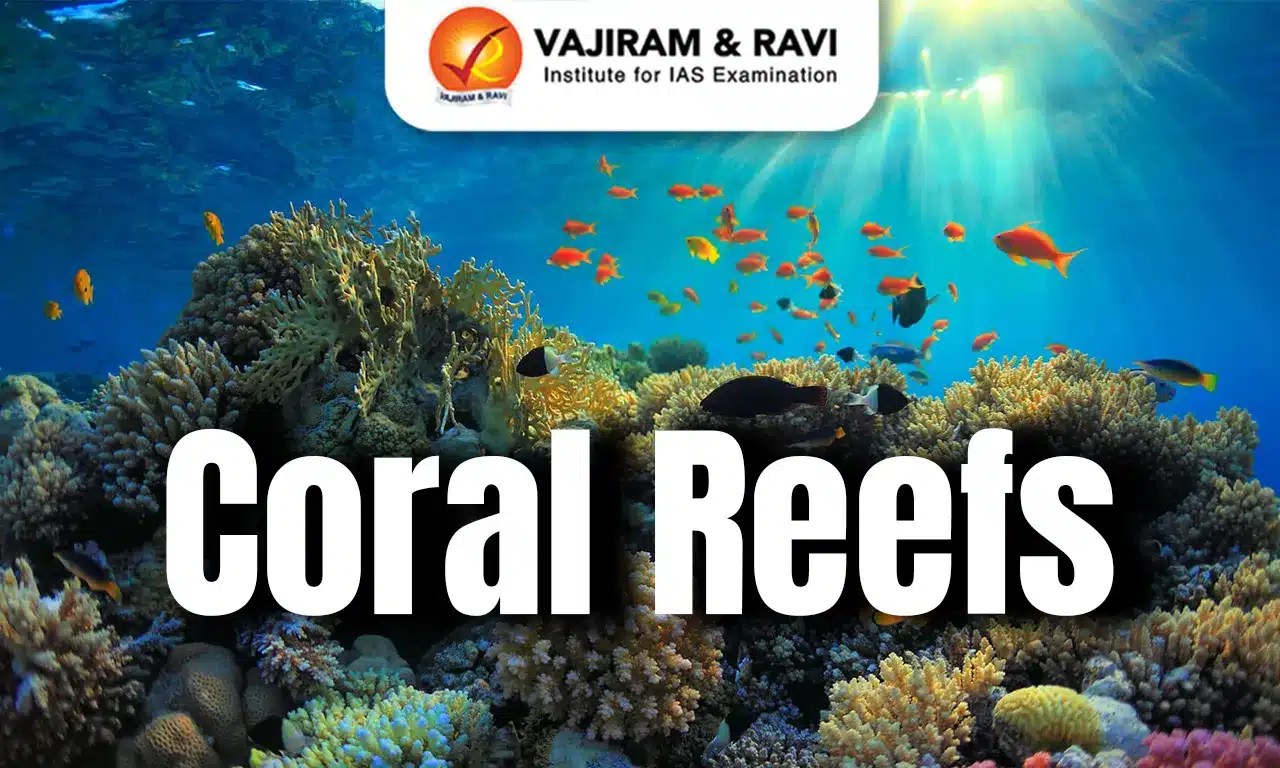Coral Reefs Latest News
Scientists at the University of California San Diego developed SNAP-X, a bio-ink enhancing coral larvae settlement by 20x, offering a breakthrough for reef restoration amid climate threats.
About Coral Reefs
- Coral reefs are marine ecosystems built by groups of coral polyps bound together by calcium carbonate. These vibrant habitats flourish in warm, clear, and shallow waters of tropical regions.
- Notable examples include the Great Barrier Reef and India’s Gulf of Mannar and Lakshadweep.
- Coral reefs offer crucial benefits, such as providing food, shielding coastlines, and supporting local economies through tourism and fishing.
- Types of Coral Reefs:
- Fringing Reefs: Found close to shorelines, separated from land by shallow lagoons. Most common type.
- Barrier Reefs: Located farther offshore, separated from land by deeper, wider lagoons. The Great Barrier Reef in Australia is the largest example.
- Atolls: Ring-shaped reefs that encircle a lagoon, often formed on sinking volcanic islands. Common in the Indian and Pacific Oceans.
Conditions Required for Coral Reef Formation
- Stable, Warm Water: Temperatures typically around 20°C, found in tropical regions between 30°N and 30°S.
- Shallow Depths: Usually up to 55 meters deep, allowing sufficient sunlight for photosynthesis.
- Clear, Low-Nutrient Saltwater: Essential for light penetration and coral health.
- Minimal Pollution: Corals are highly sensitive to chemical and sediment pollution.
- Abundant Plankton: Provides food for coral polyps.
Coral Reefs FAQs
Q1. What are called coral reefs?
Ans. Coral reefs are underwater structures made by colonies of tiny animals called coral polyps held together by calcium carbonate.
Q2. What is coral reef and its importance?
Ans. Coral reefs are diverse underwater ecosystems that protect coastlines, support fisheries, and are vital for marine biodiversity and local economies.
Q3. What are the three types of coral reefs?
Ans. The three main types are fringing reefs, barrier reefs, and atolls.
Source: Eurasia Review
Last updated on February, 2026
→ UPSC Notification 2026 is now out on the official website at upsconline.nic.in.
→ UPSC IFoS Notification 2026 is now out on the official website at upsconline.nic.in.
→ UPSC Calendar 2026 has been released.
→ UPSC Final Result 2025 is expected to be released in the second week of April 2026.
→ Check out the latest UPSC Syllabus 2026 here.
→ Join Vajiram & Ravi’s Interview Guidance Programme for expert help to crack your final UPSC stage.
→ UPSC Mains Result 2025 is now out.
→ UPSC Prelims 2026 will be conducted on 24th May, 2026 & UPSC Mains 2026 will be conducted on 21st August 2026.
→ The UPSC Selection Process is of 3 stages-Prelims, Mains and Interview.
→ Prepare effectively with Vajiram & Ravi’s UPSC Prelims Test Series 2026 featuring full-length mock tests, detailed solutions, and performance analysis.
→ Enroll in Vajiram & Ravi’s UPSC Mains Test Series 2026 for structured answer writing practice, expert evaluation, and exam-oriented feedback.
→ Join Vajiram & Ravi’s Best UPSC Mentorship Program for personalized guidance, strategy planning, and one-to-one support from experienced mentors.
→ Check UPSC Marksheet 2024 Here.
→ UPSC Toppers List 2024 is released now. Shakti Dubey is UPSC AIR 1 2024 Topper.
→ Also check Best UPSC Coaching in India
Tags: coral reefs prelims pointers upsc prelims current affairs




















